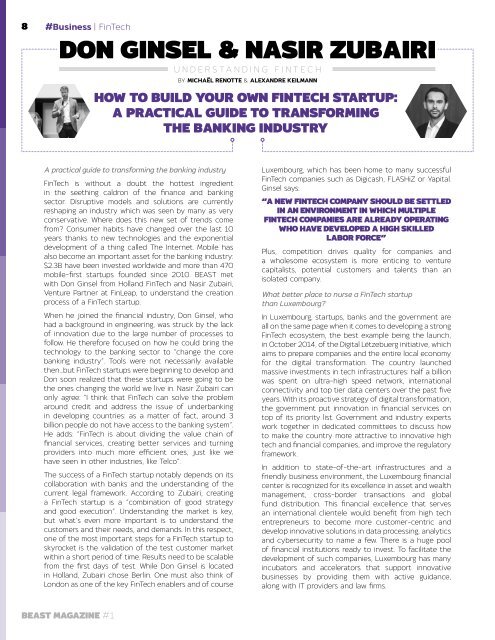BEAST Magazine #1 2015
You also want an ePaper? Increase the reach of your titles
YUMPU automatically turns print PDFs into web optimized ePapers that Google loves.
8<br />
#Business | FinTech<br />
DON GINSEL & NASIR ZUBAIRI<br />
UNDERSTANDING FINTECH<br />
BY MICHAËL RENOTTE & ALEXANDRE KEILMANN<br />
HOW TO BUILD YOUR OWN FINTECH STARTUP:<br />
A PRACTICAL GUIDE TO TRANSFORMING<br />
THE BANKING INDUSTRY<br />
A practical guide to transforming the banking industry<br />
FinTech is without a doubt the hottest ingredient<br />
in the seething caldron of the finance and banking<br />
sector. Disruptive models and solutions are currently<br />
reshaping an industry which was seen by many as very<br />
conservative. Where does this new set of trends come<br />
from? Consumer habits have changed over the last 10<br />
years thanks to new technologies and the exponential<br />
development of a thing called The Internet. Mobile has<br />
also become an important asset for the banking industry:<br />
$2.3B have been invested worldwide and more than 470<br />
mobile-first startups founded since 2010. <strong>BEAST</strong> met<br />
with Don Ginsel from Holland FinTech and Nasir Zubairi,<br />
Venture Partner at FinLeap, to understand the creation<br />
process of a FinTech startup.<br />
When he joined the financial industry, Don Ginsel, who<br />
had a background in engineering, was struck by the lack<br />
of innovation due to the large number of processes to<br />
follow. He therefore focused on how he could bring the<br />
technology to the banking sector to “change the core<br />
banking industry”. Tools were not necessarily available<br />
then…but FinTech startups were beginning to develop and<br />
Don soon realized that these startups were going to be<br />
the ones changing the world we live in. Nasir Zubairi can<br />
only agree: “I think that FinTech can solve the problem<br />
around credit and address the issue of underbanking<br />
in developing countries: as a matter of fact, around 3<br />
billion people do not have access to the banking system”.<br />
He adds: “FinTech is about dividing the value chain of<br />
financial services, creating better services and turning<br />
providers into much more efficient ones, just like we<br />
have seen in other industries, like Telco”.<br />
The success of a FinTech startup notably depends on its<br />
collaboration with banks and the understanding of the<br />
current legal framework. According to Zubairi, creating<br />
a FinTech startup is a “combination of good strategy<br />
and good execution”. Understanding the market is key,<br />
but what’s even more important is to understand the<br />
customers and their needs, and demands. In this respect,<br />
one of the most important steps for a FinTech startup to<br />
skyrocket is the validation of the test customer market<br />
within a short period of time. Results need to be scalable<br />
from the first days of test. While Don Ginsel is located<br />
in Holland, Zubairi chose Berlin. One must also think of<br />
London as one of the key FinTech enablers and of course<br />
Luxembourg, which has been home to many successful<br />
FinTech companies such as Digicash, FLASHiZ or Yapital.<br />
Ginsel says:<br />
“A NEW FINTECH COMPANY SHOULD BE SETTLED<br />
IN AN ENVIRONMENT IN WHICH MULTIPLE<br />
FINTECH COMPANIES ARE ALREADY OPERATING<br />
WHO HAVE DEVELOPED A HIGH SKILLED<br />
LABOR FORCE”<br />
Plus, competition drives quality for companies and<br />
a wholesome ecosystem is more enticing to venture<br />
capitalists, potential customers and talents than an<br />
isolated company.<br />
What better place to nurse a FinTech startup<br />
than Luxembourg?<br />
In Luxembourg, startups, banks and the government are<br />
all on the same page when it comes to developing a strong<br />
FinTech ecosystem, the best example being the launch,<br />
in October 2014, of the Digital Lëtzebuerg initiative, which<br />
aims to prepare companies and the entire local economy<br />
for the digital transformation. The country launched<br />
massive investments in tech infrastructures: half a billion<br />
was spent on ultra-high speed network, international<br />
connectivity and top tier data centers over the past five<br />
years. With its proactive strategy of digital transformation,<br />
the government put innovation in financial services on<br />
top of its priority list. Government and industry experts<br />
work together in dedicated committees to discuss how<br />
to make the country more attractive to innovative high<br />
tech and financial companies, and improve the regulatory<br />
framework.<br />
In addition to state-of-the-art infrastructures and a<br />
friendly business environment, the Luxembourg financial<br />
center is recognized for its excellence in asset and wealth<br />
management, cross-border transactions and global<br />
fund distribution. This financial excellence that serves<br />
an international clientele would benefit from high tech<br />
entrepreneurs to become more customer-centric and<br />
develop innovative solutions in data processing, analytics<br />
and cybersecurity to name a few. There is a huge pool<br />
of financial institutions ready to invest. To facilitate the<br />
development of such companies, Luxembourg has many<br />
incubators and accelerators that support innovative<br />
businesses by providing them with active guidance,<br />
along with IT providers and law firms.<br />
<strong>BEAST</strong> MAGAZINE <strong>#1</strong>


















